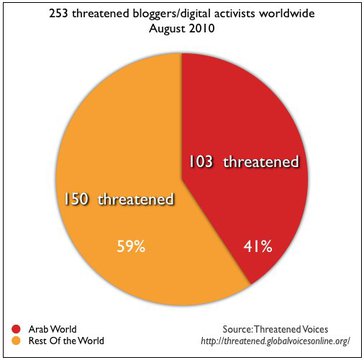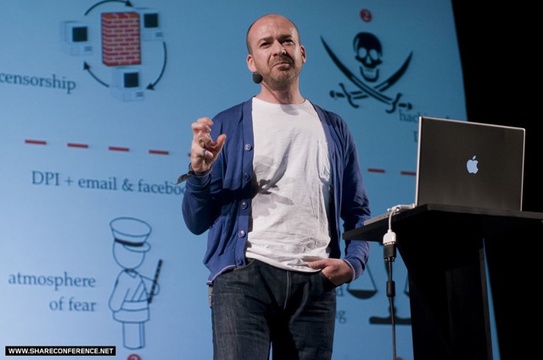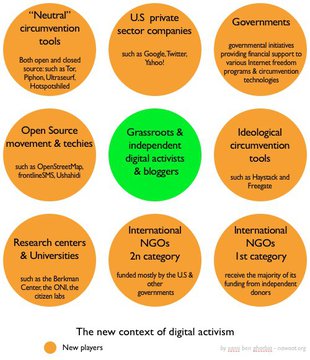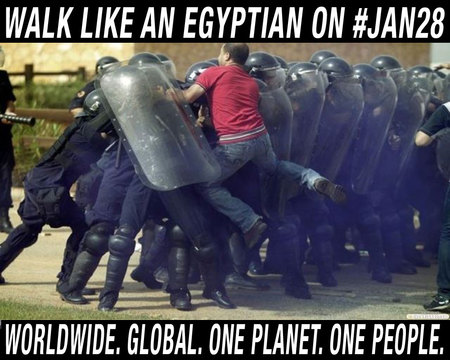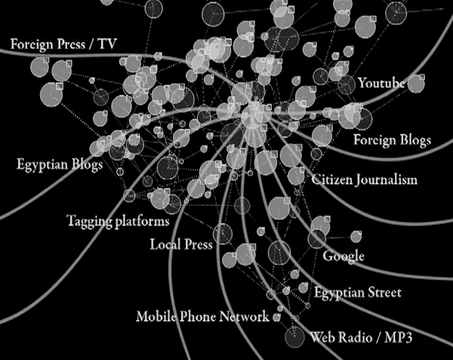Search results for 'blogosphere'
Sami Ben Gharbia
Sami BenGharbia
Sami Ben Gharbia is a Tunisian human rights campaigner, blogger, writer and freedom of expression advocate. He was a political refugee living in the Netherlands between 1998 and 2011. Sami is the author of the first Tunisian e-book (in French) Borj Erroumi XL.
From the Blogosphere to the Street: The Role of Social Media in the Egyptian Uprising
While the uprising in Egypt caught most observers of the Middle East
off guard, it did not come out of the blue. The seeds of this
spectacular mobilization had been sown as far back as the early 2000s
and had been carefully cultivated by activists from across the
political spectrum, many of these working online via Facebook, twitter,
and within the Egyptian blogosphere. Working within these media,
activists began to forge a new political language, one that cut across
the institutional barriers that had until then polarized Egypt's
political terrain, between more Islamicly-oriented currents (most
prominent among them, the Muslim Brotherhood) and secular-liberal ones.
The Internet Freedom Fallacy and Arab Digital Activism
This article focuses on grassroots digital activism in the Arab world and the risks of what seems to be an inevitable collusion with U.S foreign policy and interests. It sums up the most important elements of the conversation I have been having for the last two years with many actors involved in defending online free speech and the use of technology for social and political change. While the main focus is Arab digital activism, I have made sure to include similar concerns raised by activists and online free speech advocates from other parts of the world, such as China, Thailand, and Iran.
ReadTwelve Theses on WikiLeaks
Thesis 0
"What do I think of WikiLeaks? I think it would be a good idea!"
(after Mahatma Gandhi's famous quip on "Western Civilization")
Ten Theses on WikiLeaks
These 0.
"What do I think of WikiLeaks? I think it would be a good idea!"
(after Mahatma Gandhi's famous quip on 'Western Civilisation')
Contain This! Leaks, Whistle-Blowers and the Networked News Ecology
WikiLeaks is one of the defining stories of the internet, which means
by now, one of the defining stories of the present, period. At least
four large-scale trends which permeate our societies as a whole are
fused here into an explosive mixture whose fall-out is far from clear.
Dawn of the Organised Networks
At first glance the concept of "organised networks" appears oxymoronic. In technical terms, all networks are organised. There are founders, administrators, moderators and active members who all take up roles. Think also back to the early work on cybernetics and the "second order" cybernetics of Bateson and others. Networks consist of mobile relations whose arrangement at any particular time is shaped by the "constitutive outside" of feedback or noise.[1] The order of networks is made up of a continuum of relations governed by interests, passions, affects and pragmatic necessities of different actors. The network of relations is never static, but this is not to be mistaken for some kind of perpetual fluidity. Ephemerality is not a condition to celebrate for those wishing to function as political agents.
ReadTalking about a Revolution: An Interview with Camille Otrakji
"If you've been following events in Syria, you'd know that the
English-language press is mostly deeply critical of the Assad regime
(while the Arabic press displays a slightly wider range of views). I
thought it would be worth trying to present a minority report on the
situation from a Syrian friend of mine, although, as you will see, he
argues precisely that his position is actually held by a very
significant majority (albeit a rather quiet and frustrated majority) of
Syrians.
Camille Otrakji is a Syrian political blogger based in
Montreal. Although he tends to keep a low profile, Otrakji has been, for
the past several years, at the forefront of many of the most
interesting and influential online initiatives relating to Syrian
politics. He is one of the authors and moderators at Joshua Landis's
Syria Comment, and the founder of Creative Syria, a constellation of
websites including Mideast Image (a vast collection of original old
photographs of Middle Eastern subjects) and Syrian Think Tank (an online
debate site hosting many of Syria's top analysts). Last year, Otrakji
courted controversy with a new initiative devoted to the subject of
Syrian-Israeli peace, entitled OneMideast.org. He agreed to speak with
me about the latest events in Syria, and I'm sure that his views will
generate plenty of discussion."

